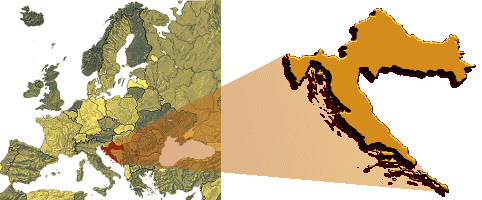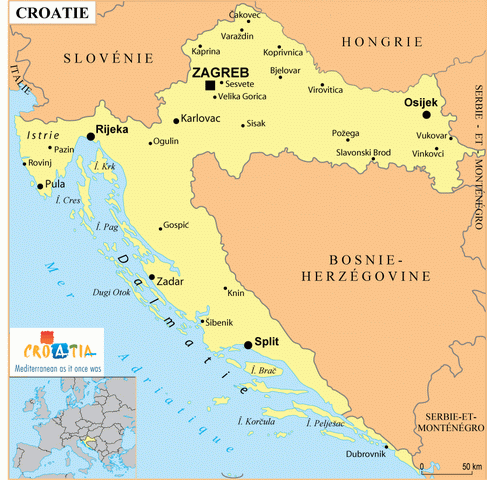 |
|
CROATIA:
According to its geographic location Croatia
is a Central European, Mediterranean country. It consists of three basic
geographic units: the Pannonian-Peripannonian (moderate continental
climate), the Mediterranean or coastal (Mediterranean climate), and
the highland unit (mountainous climate).
 As a tourist country it is known for its natural beauties and well-indented coast with a total of 1,185 islands, isles and cliffs. It has 2,600 sunny hours per year, which makes it one of the sunniest countries in Europe. Due to its geographic location between the Alps and the Adriatic Sea, as well as in the delta of the Una, Kupa, Sava, Drava and Danube River there is great climatic variability, and therefore different flora and fauna.  The seaside area, i.e. the coastal stretch by the Adriatic embraces the islands, the coast and the lower hinterland as well as two kinds of climate: the Mediterranean (in the coastal area and on the islands) and the continental. The indented coast is 1,777 kilometers long, and the coastline along with 1,185 islands and isles amounts to 4,012 kilometers. The climate is characterized by hot summers, many sunny days, and mild and rainy winters. For instance the island of Hvar (with an average temperature of 8.7 Co in January) has 2,718 hours of sunshine a year, Dubrovnik has 2,584. As a comparison, Nice has 2,706 sunny hours. The main natural peculiarity is the blue sea, the coastal karts, and the Mediterranean vegetation. Nautical tourism - The Adriatic Sea is an extraordinarily interesting and attractive resource of the Croatian nautical possibilities. It got its name from an ancient port of the same name. The Adriatic spans from the Balkan to the Apennine peninsula. The part belonging to the Republic of Croatia is the east coast, which extends all the way from Prevlaka in the south to cape Savudrija in the west, including all islands, islets and cliffs along the coast, and the archipelago of Palagruza. This is a unique area in Europe for cruising with motorboats, speedboats, or sailboats, but also for enjoying the underwater world. Croatia has 41 marinas with all necessary accompanying facilities at its disposal. Croatia
was part of Yugoslavia - it is bordered by Italy on the West/across
the Adriatic Sea - Slovenia & Hungary on the North - Serbia/Yugoslavia
on the East - Bosnia/Herzegovina on the South - Most of the west coast
is on the Adriatic Sea, which is one of Europe's main beach/sea tourist
destinations. Croatia has three geographic types - Mountains mostly
in North and Inland from the Adriatic Sea - Coastal on the west - Plains
in the eastern 1/3 of Croatia - The tourist industry is very diverse
offering wine areas - sailing/diving/beach areas - climbing/hiking/health
resorts in the mountains - Sightseeing is as diverse with churches/amphitheatre/historical
site dating back to 50AD - The Amphitheatre is still used today - Also
including 5 UNESCO heritage sites. |
